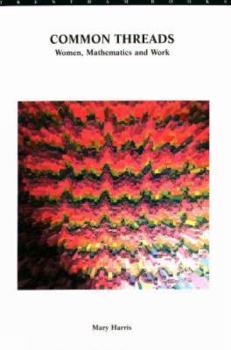Common Threads: Women, Mathematics and Work
Throughout the world the largest group of people who underachieve in mathematics is women and girls. And the largest group of people who knit, sew and weave is women and girls. Recently, an exhibition... This description may be from another edition of this product.
Format:Paperback
Language:English
ISBN:1858560152
ISBN13:9781858560151
Release Date:June 1997
Publisher:Trentham Books
Length:213 Pages
Weight:1.14 lbs.
Dimensions:0.6" x 6.9" x 9.6"
Customer Reviews
1 rating
A Tapestry of Mathematical Intelligence
Published by Thriftbooks.com User , 18 years ago
I like Mary Harris' book. It is both a history and dialogue with the reader about the social control and gendering of mathematics and education, focusing upon the abusive subordination of women and girls. The title Common Threads is from an interactive exhibit she designed, produced, and presented in many countries, bringing together a variety of hands-on sewing and needlecraft to challenge centuries of gender stereotypes about mathematics: that it is masculine and, because it requires high levels of intellect, is obviously no place for girls. A basic theme of Common Threads is that while over the centuries girls were relegated to such presumed "mindless" activities held not to require much intellect, those very activities are in fact very mindful and embedded with very high level mathematical concepts and operations. Just as the famous "Penrose Tiles" and "Four Color Problem" entail the application of very high level abstract concepts, operations, and theorems to material objects and patterns, one finds the same fruitful abstract mathematical applications in patterns and designs of sewing. But because women and girls are generally the ones who sew--a fact that is itself a result of centuries of sex role stereotyping by male religious and educational powers--the mathematical intelligence found implicitly in those activities is usually either not recognized or is denied outright. The mathematical knowledge found there is denied by those mathematicians of a theoretical bent. These are usually white upper class males educated in institutional mathematics, who insist that abstract theorems must be known explicitly in theory prior to any application to material objects or designs, or one does not know them at all. Without that theoretical knowledge, sewing certain complex patterns is simply sewing. It is not mathematics. Their objections highlight an issue between "theory and practice" found in the distinction Harris notes between institutional mathematics, a body of infallible knowledge waiting to be memorized or otherwise instilled into passive students--and ethnomathematics, found in the cultural "living interests" of a people. Because mathematics is used and abused as the language of power, the means by which political, commercial, industrial, scientific and technological progress are measured, it has largely been used as the language of control. Thus, the most widespread use of mathematics, according to Harris, has been its use to fail people, particularly women. As she notes from another author, mathematics as a body of infallible knowledge can bear no social responsibility. But conceived as a way of coming to know, a living and developing knowing, it has a place in the daily lives of everyone. Harris' book is timely, especially in the face of growing reactionary efforts in education, particularly in higher education, to keep women students out of academic areas such as math, science and engineering, based





